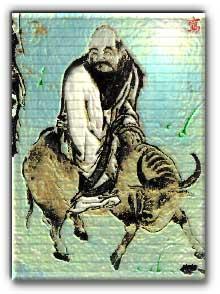 |
|
 |
||||||
Religion: |
||||||
Lao Tzu wrote that the world results from the interplay of natural forces, not from the acts of one or more supernatural beings. Virtue is prudent, humble action in line with an appreciation of these natural forces. Virtue does not mean obeying the laws of gods or kings. "Lao" means "Old" and Tzu" means "Master," as in Chuang Tzu and K'ung Fu Tzu (Confucius). What I don't know is whether it is best understood as "Master Old" (with "Old" serving as a name) or as "[the] Old Master." When I first read the Tao Te Ching ("Book of the Way of Virtue" or something), I didn't get much out of it. Chuang Tzu's writing, however, was a lot more approachable. After reading Chuang Tzu and contemporary writers, I was able to understand Lao Tzu. Lots of original thinkers in history have popularizers that come after them and make their ideas more accessible. Lao Tzu has Chuang Tzu, Socrates has Plato, and Jesus has Paul. —JoT |
||||||